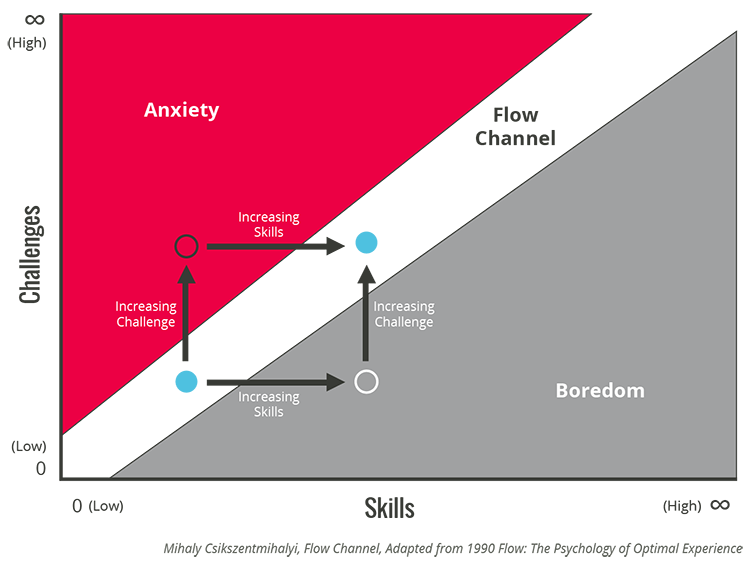
Flow Theory aka the "Zone" is a concept developed by a psychologist named by Mihály Csíkszentmihályi in 1975. According to Csíkszentmihályi, Flow Theory involves 6 components:
Intense and focused concentration on the present moment
Merging of action and awareness
A loss of reflective self-consciousness
A sense of personal control or agency over the situation or activity
A distortion of temporal experience, one's subjective experience of time is altered
Experience of the activity as intrinsically rewarding, also referred to as autotelic experience
Most commonly, Flow Theory aka the "Zone" is referenced in the world of sports. This is not surprising, as sports are an excellent bridge-way to the Flow Channel/The Zone/Present Moment (Now). Often sports are so enjoyable that the human mind is able to transcend thought/The Ego and pay complete attention to the present moment for at least a brief period of time. Undoubtedly, entering the Flow Channel is typically a challenging task for most humans, as we tend to listen and identify to every little thought in our heads.
In general, our thinking mind tends to vacillate between past and future thoughts with little focus on Now, where everything in life transpires. A key aspect of more readily entering the Flow Channel/The Zone/Present Moment (Now) is recognizing that you are more than the thoughts in your head. In fact, your thinking mind is NOT you - it is your instrument and gradually harnessing more control over your thoughts will allow you to more readily enter Flow Channel/The Zone/Present Moment (Now) even in the absence of a strong bridge-way such as sports.
In meditation, the bridge-way to the Present Moment (Now) is not sports it is the quintessential/most primal bridge-way - Breathing. That is why you will hear spiritual teachers say "Focus on your breathing" because your breath is always Now, while your mind maybe temporally elsewhere. A famous mantra in meditative teachings states "No self - No problem". The implication of this brilliant teaching is that when you dissolve your thinking mind you will feel increased present moment awareness and inherently less anxiety and depression. Mastering this teaching requires daily practice that most American's will tell you they do not have time to do. The ultimate goal of this practice is not to walk around all day with zero thoughts, but rather use your brain as a tool (plan/reflect) and not fall victim to the daily mental/emotional fluctuations our brains create. If western culture can find time to focus on TV for hours at a time we can surely find three 5 minute moments per day to practice quieting our minds and help our collective mental health. This is indeed one of the most valuable skills in life.
Top 3 Tips for Harnessing more control of you thinking mind:
3 times per day focus on your breathing - take 5 deep breathing - in through your nose, out through your mouth.
Passively watch your thoughts - this is another famous teaching in meditation - without judgement follow the pattern of your thoughts - pay attention to how your thoughts fluctuate between the past/future and how this impacts your emotions.
Name 3 things you are grateful for in your immediate environment that you typically don't perceive as a gift such as your shoes or clean water. There are many gifts all around us - begin to notice all of them on a granular level - this will also induce a sense of social awareness, which is a key component to gaining better control of your thinking mind.
Top 3 Resources for continued learning:
Stillness Speaks by Eckhart Tolle
No Boundaries by Ken Wilber
2004 TED Talk by Mihály Csíkszentmihályi on Flow Theory
If you found this information helpful please follow me and comment below. Thank you for your time.
@Jerrybanfield Have you ever heard of Flow theory? Pretty cool stuff.